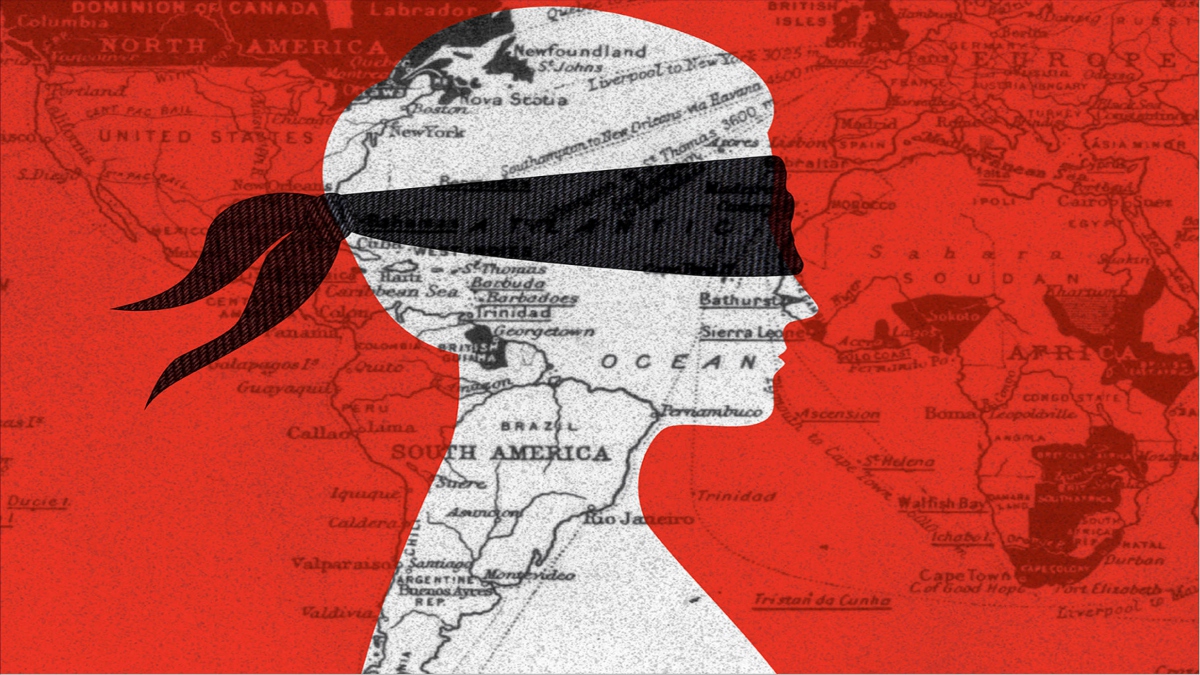I had ended the previous piece on the note that the relationship between the European colonizer’s religion and the evangelical nature of his colonization merited scrutiny. Fortunately, there is some scholarly literature on the subject. A reading of the literature on colonialism reveals that the story of European colonialism may be traced to what has been referred to as “the Age of Discovery” in the fifteenth century when Christopher Columbus set out in 1492 to “discover” the “New World”, namely the non-Christian world. There is consensus among scholars of coloniality/decoloniality that Columbus’s voyage marked the beginning of European colonization and heralded a new chapter in European history which led to emergence of new conceptions of time, space and subjectivity that had implications for that continent and most importantly, for “others”. Scholars agree that the Age of Discovery was the predecessor to and led to the Renaissance, the Reformation and the Age of Enlightenment/Reason, which included milestones such as the Treaty of Westphalia and the Industrial Revolution.
The use of “The” for each of these essentially European milestones by Europeans and the rest is significant for it demonstrates the universalization of this history as the history of humanity, in particular its “modern” history. The period between the fifteenth and nineteenth centuries has been credited with the birth of “modernity” and several “modern” concepts and ideas which, not only Europe, but the entire world, including postcolonial societies, take for granted today and proudly base their discourse on. Such modern ideas have significantly affected and altered conceptions of religion, language, political organization of societies, the nature of State, its relationship with religion and secularism, conceptions of law and human rights, humanism, treatment of genders, science, treatment of nature and notions of development and the like. The European position on each of these essential facets of life was introduced and universalized in all societies which formed part of the colonizing Empires, after replacing indigenous worldviews, which has engendered a debate around the interpretation of Columbus’s voyage.
The celebration of the Age of Discovery by proponents of Europe is understandable because the period was preceded by the Dark Ages for a millennium. However, since the rest of the world did not live in the Dark Ages prior to the fifteenth century, the celebration of the Discovery and the Enlightenment by several postcolonial societies is truly tragic and naïve since they haven’t even scratched the surface to understand the racial and religious supremacist character of the Age of Discovery and what followed it. Critically, several postcolonial societies are yet to fully understand the impact the Enlightenment has had on their ability to evaluate the history of their own cultures sans the judgement and sanctimony induced by the Enlightenment. It is for this reason that the study of the history of coloniality is imperative.
While one school of thought, the “modern” school, believes that his voyage was and must be seen as a “glorious and heroic achievement” which marked the beginning of the Christian West’s “destiny” to “liberate” non-Christian indigenous societies from their wretched existence; the other school, namely the decolonial one, believes that the voyage marked the beginning of one of the most repressive, bloody, racist and genocidal chapters ever witnessed in human history that led to the extinction of several cultures and, critically, wreaked havoc on nature on an unprecedented scale. The latter school asserts that the Age of Discovery and the period that followed thereafter were responsible for two developments which reshaped the world, namely the emergence of modern categories of religion and race and their intertwined relationship with coloniality, and therefore with the “cultural complex” of modernity/rationality.
In its early stages, the focus of pioneers of decoloniality scholarship such as Anibal Quijano was on the colonial character of power, the centrality of race to European coloniality, and its inextricable nexus with modernity/rationality. Quijano identified that the process of classification of the world on racial lines by the European colonizer, owing to the colonizer’s own racial awareness, led to sub-humanization and dehumanization of several communities depending on their perceived worth is the eyes of the colonizer. The ramifications of such classification included geographic identities acquiring racial connotations, specific skin complexions being imputed to the races of the colonizer and the colonized, and the creation of a new structure of division of labour, resources and the fruits of labour. Each of these strands ultimately contributed to creations of serfdoms and slavery, of notions of master/superior and slave/inferior races, of notions of the manifest destiny of some to rule over others and the fate of others to be perpetually ruled, the West and the East, the civilized and the primitive, scientific and magic/mythic-scientific, rational and irrational, modern and tradition, history and mythology, essentially Europe and not Europe. Even where the colonizer realized that there was culture and civilization outside of Europe, he resorted to stereotyping and exotification by calling it the Orient, the other of the Occident.
That this racial classification of entire humanity to subserve colonial interests forms the foundation of Eurocentric/Western-centric global capitalism has been incisively captured in Quijano’s work. He, in fact, highlighted the relationship between European colonialism, Eurocentric/Western-centric global capitalism and Western-centric globalization which resulted in the entirety of human experience revolving around European/Western hegemony, which critical included control over “all forms of subjectivity, culture and especially knowledge and the production of knowledge”. Quijano did not mince words in calling globalization the “culmination of a process that began with the constitution of America and colonial/modern Eurocentered capitalism as a new global power”. To him, notwithstanding globalization’s professed love for a “global village”, race and therefore coloniality remained as relevant as they were in the colonial era. Globalization, contrary to popular perception, is not a friend of diversity or a melting pot of cultures. On the contrary, it means eradication of heterogeneity, more particularly diversity of indigeneity, and is proof of existence of common denominator of culture and civilization for the entire world.
Apart from the centrality of race to European colonization, Quijano did touch upon the ways in which colonized societies were forced to learn and adopt the culture of the colonizer so as to aid the process of colonization, which included learning both the material and metaphysical, specifically Judeo-Christian religious traditions. That said, the Christian character of the origins of the Age of Discovery, namely Christopher Columbus’s expansionist voyage of “discovery”, was dealt with more explicitly by Jamaican writer and cultural theorist, Sylvia Wynter, and Nelson Maldonado-Torres, a Professor of Latino and Caribbean Studies, who have contributed to the understanding of the role of the Christian religion in European colonization and its effect on the racial consciousness of the European colonizer.
Sylvia Wynter drew attention to the “reconceptualization of geography and the very meaning of humanity” triggered by the Age of Discovery. Critically, Wynter argued that since the Age of Discovery altered conceptions of time, space and subjectivity, it altered notions of care for the self and care for others since humans use time, space and subjectivity to make sense of themselves and their surroundings. This meant that the Age of Discovery also led to new conceptions of life and death, and legal agency over them. In a nutshell, coloniality/modernity affected not just ontology, theology, epistemology and anthropology, it also birthed new notions of ethics (and therefore affected education), and defined both politics and legislation.
Wynter was also forthright in her view that the Age of Discovery, evangelization and colonization went hand in hand, and credited that period with “secularization of the key elements of the Christian episteme”, which meant that what was valid for and in the Christian worldview was deemed good for the entire world, and those that did not conform to the Christian worldview had to convert or perish. According to Wynter, the treatment of “pagan polytheistic peoples” as “idolators” by Columbus was traceable to the “(a) Judeo-Christian perception of the world’s population as being divided up into Christians (who had heard and accepted the new Word of the gospel), (b) infidels like the Muslims and Jews who, although they were monotheists, had refused the Word, and (c) those pagan polytheistic peoples who had either ignored or had not as yet been preached the Word”. She was of the view that the religious term “idolator” informed the meaning of the secular terms “Indios/Indians” which led to the religion-induced racial othering of non-Christian idol-worshipping communities encountered by Columbus. The encounter of the Christian European colonizer with non-Christian idol-worshipping societies, in turn, led to justifications of liberation and civilization being offered for the colonization of racially and religiously inferior people, ultimately paving the way for slavery.
Building on the works of Quijano and Wynter, Nelson Maldonado-Torres suggested that religion as an anthropological category and race as an organizing principle of human identification and social organization were the products of European colonialism which only expanded with the growth of Western modernity. According to him, both religion and race were constituted together and became two of the most central categories which altered global history at every level. Therefore, the critical theory of religion is high relevant to understand the critical theory of race, and both are relevant for ethics. Simply put, any understanding of coloniality/modernity is incomplete without applying the twin lenses of religion and race, and the only way to present an alternative foundation for ethics is adopt a decolonial approach given the near-complete hegemony of coloniality/modernity on contemporary ideas of ethics.
According to Torres, the Age of Discovery necessitated the broadening of the understanding of European conceptions of religion when the Christian European colonizer came into contact with non-Christian indigenous societies in the “New World”. Citing the work of Guy Stroumsa, an Israeli scholar of religion, Torres took the view that Discovery prompted a new approach to religion in view of Christianity’s encounter with Amerindian religions, which is what makes the age of Discovery relevant for understanding the emergence of the modern categories of religion and race, which was a major “epistemic revolution” in its own right. Also, according to him, the nexus between race and religion was understood better taking into account Christianity’s theological conceptions of Judaism given its attempts to sever itself from its Jewish racial roots as well as its perceptions of Islam. For a more comprehensive understanding of race-religion interplay, he suggested inclusion of perceptions of blackness and indigeneity as well.
On the issue of broadening of conceptions of religion upon Christianity’s encounter with indigenous societies, Torres’s interpretation of Columbus’s encounter with the native peoples of Americas differs from Wynter’s. He was of the view that since Christianity recognized only the three categories of Christians, Infidels and Idolators, Columbus initially could not place the native peoples of Americas in any of three categories known to Christian theology and therefore, he assumed that the native peoples were not people from the wrong/false religion, but people without religion. And the absence of religion was perceived as absence of a soul, with soul being a condition precedent for a human to establish a connect with the divine. This soul and non-soul divide, according to Torres, led to the race consciousness in the European colonizer because he effectively saw the native peoples as non-souls who belonged to a differed race altogether. This converted religion into an anthropological category because it had become a marker of race.
That the European Christian colonizer was white and the native peoples were “black” was not lost on the former. Therefore, the White Christian was the one with soul and therefore fully human, and the black native was without soul and therefore not fully human or fully non-human. As a consequence, owing to this crucible of religion, race and colour, the soulless non-Christian black natives were subjected to religion-induced dehumanization, which justified and facilitated their treatment as slaves, or at the very least on whom the light of Christianity, Europeanness and civilization must be shone. Entire continents, societies and peoples were associated with soulnessness and either converted or enslaved, which means, according to the Christian colonizer, conversion infused soul into the dark soulless native. Simply put, in the view of the Christian European colonizer, he wasn’t merely saving the soul of a non-Christian Infidel or Idolator, but was breathing soul into a sub-human, almost an animal, through his civilizing Christianizing European touch. And if this healing touch was resisted, the sub-human had to be put down ruthlessly like a beast.
What is important to note is that whether approached from the perspective of Wynter that natives were seen as idolators by Columbus, or from the point of view of Torres that Columbus considered them soulless, both views emanating from Christian theology as its existed then, the endgame for non-Christian native communities was the same- convert or die.
In her paper on the impact of colonial contact on the cultural heritage of native American Indian people, Nassima Dalal, a scholar of religious studies, suggested that evangelical attempts to convert indigenous populations had more than one objective, the first was of course to spread the Word of the Gospel and the second was to acquire their land. Some would say, it was the other way around and that religion was used as a means to an end, the end being integration of native peoples into the European culture and complete elimination of the native culture. This was achieved through several ways and means, one of which was to massacre vast numbers of a community, and to ensure that the rest of the community fell in line they were forced into reservations with minimal resources.
In some cases, diseases such as smallpox and the plague were introduced with the knowledge that the indigenous community was not immune to them. There are recorded instances of “voluntary conversions” by indigenous peoples when the threat of confrontation with the colonizer loomed large. The hope was that such conversions to Christianity would prevent violence and start a dialogue between the communities. Clearly, such conversions were seen as the only alternative to annihilation. This largely explains the present Christian character of the Americas or Christianization of large parts of the Caribbean and Africa which should come as no surprise since it is the direct consequence of the centralization/universalisation of White Christian European culture in the colonized societies. This, the Christian European colonizer, passed off as his benevolence for he was saving the heathen native’s soul from the latter’s own ignorance, superstition and savagery.
In this regard, Quijano believed that Latin America was the most extreme case of cultural colonization by Europe in contrast to the high cultures of Asia and the Middle East which fared relatively better under the yoke of colonization, while some other societies like African societies suffered from extreme exotification. Nevertheless, Quijano was of the view that the cultures of Asia and the Middle East too were rendered subservient to the European Way thanks to coloniality. The survival of indigenous societies and cultures of Asia and the Middle East is not due to the European colonizer’s lack of trying but because they put up fierce resistance which the coloniser did not expect.
J. Sai Deepak is an Advocate practising as an arguing counsel before the Supreme Court of India and the High Court of Delhi.
MORE IN THE NEXT PIECE







